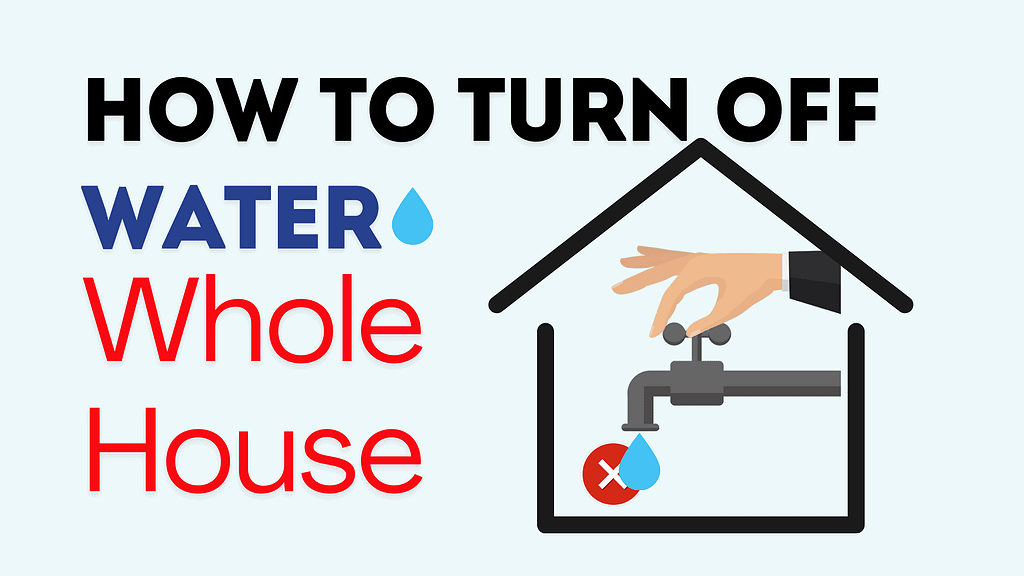
How to Turn Off Water to Your Whole House (and Individual Fixtures)
When plumbing emergencies strike, knowing how to quickly turn off the water can save you thousands of dollars in damage. Whether you need to shut off water to your entire home or just a specific area like the kitchen sink, shower, or water heater, we’ve got you covered.
At GPS Plumbing, we help North Texas homeowners protect their homes by making water shutoffs simple. Below, you’ll find step-by-step instructions for shutting off water to your whole house — plus quick links to detailed guides for shutting off water to individual fixtures. Be ready for anything with this complete guide!
Why It's Important to Know How to Turn Off Water to Your Home
From burst pipes to minor leaks, controlling the water flow can save you from costly repairs. Shutting off the water supply at the main valve is your first step in managing any water-related issues. Plus, turning off water during maintenance or when leaving for extended vacations can protect your home from unexpected leaks.
Tools You Will Need:
- Water Meter Key: Used to turn off the water at the water meter.
- Meter Box Key: Required to open the water meter box, where the main shut-off valve is located.
- Adjustable Wrench: May be needed if the shut-off valve is stiff or hard to turn.
How to Locate and Turn Off the Water to the Whole House
The main water shut-off valve is typically located in one of two places: inside your home or outside near your property line. If you need to shut off all water to your home immediately — whether for a leak, repair, or freeze prevention — the main shut-off valve is your first step. It's typically located in your garage, utility room, or exterior wall. If you can't find it, the city shutoff at your water meter is a backup option.
Tip: If your valve won't budge or breaks, call GPS Plumbing or your local fire department for help shutting water off at the street meter.
Here’s how you can locate it and turn it off:
1. Finding the Water Meter Box
The water meter box is usually found near the curb or sidewalk, often in the front yard or near the driveway. It’s generally a rectangular or round box marked “Water” or “Water Meter.” In some homes, particularly older ones, it might be located in the basement or crawlspace.
2. Opening the Water Meter Box
You’ll need a meter box key to open the water meter box. Insert the key into the slot on the box’s lid and twist to lift it. Be cautious—these boxes can sometimes contain dirt, insects, or debris. Clear out any obstructions before proceeding.
3. Using the Water Meter Key to Turn Off the Water
Once inside the water meter box, you should see a valve connected to the water meter. This is the main shut-off valve. To turn off the water:
- Use your water meter key (a long tool specifically designed for this task).
- Fit the key onto the valve and rotate it clockwise until it stops. This will cut off the water supply to your entire house.
4. Test the Water Shut-Off
Once you’ve turned the valve off, go inside and turn on a faucet or flush a toilet to confirm the water is off. If no water comes out, you’ve successfully shut off the supply.
How to Turn Off Water to Individual Fixtures
If you’re dealing with a smaller issue, such as a leaky faucet or a malfunctioning appliance, you might only need to turn off the water to a specific fixture rather than the entire house. Below are links to helpful guides that explain how to shut off water to individual fixtures.
- How to Turn Off Water to a Kitchen Sink: Learn how to quickly stop water flow to your kitchen sink in case of a leak or faucet repair.
- How to Turn Off Water to a Toilet: Discover how to shut off water to your toilet to avoid overflowing or repair internal parts.
- How to Turn Off Water to a Kitchen Sink: Follow this guide for shutting off water to a faucet when doing repairs or replacements.
- How to Turn Off Water to a Washing Machine: Stop water flow to your washing machine quickly in case of a leak or hose malfunction.
- How to Turn Off Water to a Refrigerator: Find out how to shut off water to your refrigerator, especially if it has a water dispenser or ice maker.
- How to Turn Off Water to Your Bathroom Sink: Learn the steps to quickly stop the water flow to your bathroom sink during leaks or repairs.
- How to Turn Off Water to a Water Heater: Learn how to shut off water to your water heater during maintenance or if it’s leaking.
When Should You Turn Off Water to the Whole House?
Turning off the main water supply should be done in the following scenarios:
1. Emergency Situations
In the event of a burst pipe, major leak, or flood, turning off the main water supply can prevent thousands of dollars in damage. Always locate and know how to use the main shut-off valve before an emergency strikes.
2. Plumbing Repairs
Whether you’re installing a new water heater or replacing a faucet, shutting off the water supply prevents unwanted leaks or water damage during the repair.
3. Going on Vacation
If you're going away for an extended period, it’s a good idea to turn off the water to your entire house. This can protect your home from unexpected leaks while you’re gone.
What to Do If You Can’t Turn Off the Water
In some cases, the shut-off valve may be stuck or hard to turn due to corrosion, age, or lack of use. Here are some tips if you can’t turn off the water:
- Use an adjustable wrench to get better leverage on a stubborn valve.
- Apply a lubricant like WD-40 to help loosen the valve.
- If the valve still won't turn, contact a licensed plumber immediately. They can assist with turning off the water and may recommend replacing an old or faulty valve.
Maintaining Your Shut-Off Valve
Your main shut-off valve doesn’t get used very often, which can cause it to become stiff or stuck over time. Make it a habit to turn the valve off and on once a year to ensure it's functional. This simple maintenance task can save you valuable time in an emergency.
Final Thoughts: Know How to Turn Off Water to Your Whole House
Knowing how to turn off the water to your whole house is a crucial skill that every homeowner should have. Whether it's for routine maintenance, a plumbing project, or an emergency, shutting off the water quickly can prevent damage and save you money. Be sure to check out our other guides for turning off water to individual fixtures like sinks, toilets, and more.
For professional plumbing services or assistance with your shut-off valves, contact GPS Plumbing. Our licensed plumbers are ready to help with any plumbing issues, ensuring your home stays safe and your water system runs smoothly. 🎥 Watch: How to Find and Turn Off Your Home's Water Supply
💡 Smart Tip: Installing a Wi-Fi smart water shut-off system can automatically protect your home from leaks — even when you're away. Learn more about smart plumbing technology here.

